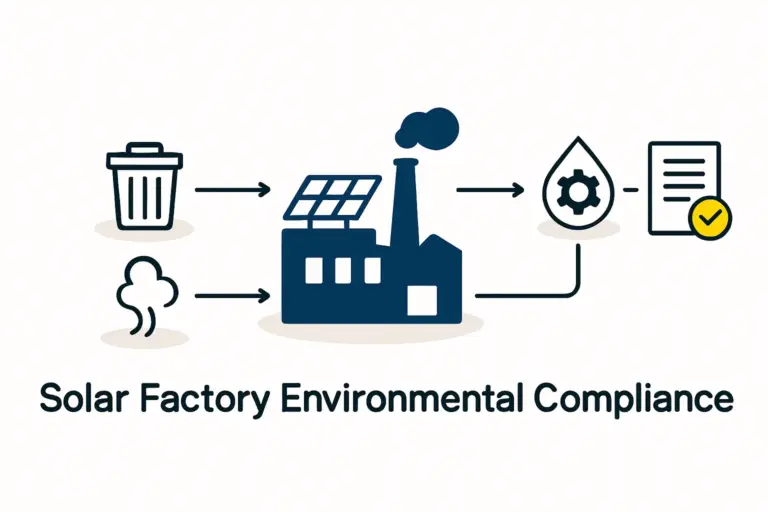For many international entrepreneurs, entering a new market raises immediate questions about local ownership laws. In the Gulf region, there’s a common perception that foreign businesses require a majority local partner. While this was historically true, Kuwait—a nation built on oil wealth—is actively opening new pathways for international investors, especially in strategic sectors like renewable energy.
The opportunity is clear: Kuwait’s ‘Vision 2035’ national development plan places a strong emphasis on economic diversification and sustainable energy. This creates a favorable environment for those looking to establish solar manufacturing operations. However, navigating the legal framework is the first critical step. This guide outlines the structures available to foreign investors, focusing on how to establish a 100% foreign-owned solar manufacturing enterprise in Kuwait.
The Standard Framework: Kuwait’s Traditional Business Ownership Rules
Traditionally, the Companies Law has set the default legal structure for businesses in Kuwait. This framework requires that at least 51% of any company be owned by a Kuwaiti or Gulf Cooperation Council (GCC) citizen, a regulation established to ensure local participation and benefit from economic growth.
This 51% requirement has long been a major consideration for foreign investors, as it involves finding and building a trusted relationship with a local partner. This structure can present challenges, especially when securing the right local partners for your solar business. While viable for many ventures, it may not be the ideal model for an investor seeking full control over their operations and technology.
A New Path for Investors: The Foreign Direct Investment Law No. 116 of 2013
Recognizing the need to attract specialized expertise and capital, Kuwait introduced a landmark piece of legislation: the Foreign Direct Investment (FDI) Law. This law significantly changed the environment for international businesses by creating a regulated pathway to 100% foreign ownership.
The primary objective of the FDI Law is to attract investment in sectors that advance Kuwait’s economic diversification, job creation, and technology transfer. To oversee this, the law established the Kuwait Direct Investment Promotion Authority (KDIPA).
The Role of KDIPA: Your Gateway to 100% Foreign Ownership
KDIPA acts as the central body for reviewing and licensing foreign investment projects that fall outside the traditional 51% local ownership rule. It functions not just as a regulator but as a facilitator, designed to streamline the entry process for qualifying investors.
The process involves submitting a detailed application to KDIPA for an ‘investment license’. An approved license grants the foreign investor the right to establish a 100% foreign-owned Kuwaiti company, a powerful exception to the standard commercial laws. A key part of the application involves demonstrating how the project aligns with Kuwait’s development goals, often detailed in a comprehensive solar manufacturing business plan.

Is Solar Manufacturing a ‘Strategic Sector’?
Eligibility for a KDIPA license depends on the industry. The authority maintains a ‘negative list’ of sectors that are not open to 100% foreign investment. Crucially, sectors that support the goals of ‘Vision 2035’ are actively encouraged.
Renewable energy technology, manufacturing, and related services fall squarely within this strategic focus. Establishing a solar panel production facility aligns perfectly with Kuwait’s goals of:
- Diversifying energy sources: Reducing reliance on fossil fuels for domestic power generation.
- Building local capacity: Creating skilled jobs and a domestic manufacturing base.
- Transferring technology: Importing advanced manufacturing knowledge and processes.
A well-structured proposal for a solar module factory, therefore, has a strong case for approval by KDIPA.
Key Incentives Offered Under the FDI Law
Beyond the primary benefit of 100% ownership, a KDIPA license offers a suite of powerful incentives designed to de-risk the investment and improve financial viability. These incentives often include:
- Tax Exemptions: A potential income tax exemption for up to 10 years.
- Customs Duty Waivers: Exemption from customs duties on imported machinery, equipment, and raw materials. This is a significant cost-saving factor for a new factory.
- Land and Property Rights: Assistance in securing land and real estate for the project.
- Full Repatriation of Profits: The right to transfer all profits and capital out of the country without restrictions.
- Guarantees: Legal protection against expropriation or nationalization of the investment.
Based on experience from J.v.G. turnkey projects, these incentives can dramatically improve return on investment calculations and shorten the payback period for a new solar factory.
An Alternative Route: Kuwait’s Free Trade Zones
Another established path for 100% foreign ownership is to operate within one of Kuwait’s designated free trade zones, such as the Kuwait Free Trade Zone (KFTZ) located at Shuwaikh Port.
Free zones operate under a different set of economic regulations than the rest of the country. For businesses established within their boundaries, key benefits typically include:
- 100% foreign ownership as a standard rule.
- Simplified import-export procedures.
- Exemption from customs duties.
- Dedicated infrastructure and logistics support.

This option is particularly well-suited for businesses focused on assembly and re-export, as they can leverage the port’s logistical advantages. The primary limitation is geographical: your operations must be physically located within the zone’s demarcated area.
Comparing the Paths: KDIPA vs. Free Trade Zone
Choosing the right structure depends entirely on the business model.
The KDIPA route is ideal for a significant, nation-building project. A large-scale solar panel factory intended to supply both the domestic Kuwaiti market and the wider region would benefit from the national-level incentives and the freedom to choose a location anywhere in the country. While the application process is more rigorous, the long-term benefits, especially the tax holiday, can be substantial.
The free trade zone route is an excellent choice for an operation that is primarily export-oriented. If the business plan involves importing components, assembling modules, and shipping them to other markets in the Middle East or Africa, the streamlined logistics and customs environment of a free zone offer distinct advantages and a potentially faster setup time.

Frequently Asked Questions (FAQ)
What is the minimum investment required for KDIPA approval?
There is no officially stated minimum capital investment. Approval is based on the strategic value, economic impact, and overall credibility of the business plan, rather than a specific monetary threshold.
How long does the KDIPA application process take?
The timeline can vary depending on the complexity of the project and the completeness of the application. Investors should anticipate a process of several months, from initial submission to final approval.
Is it necessary to hire a local consultant or lawyer?
While not legally mandatory, it is highly advisable. Navigating the application process with KDIPA and fulfilling all local regulatory requirements is complex. Experienced local legal and business consultants can provide invaluable guidance and prevent costly delays.
What are the rules regarding the employment of foreign staff?
Kuwaiti labor law applies to all companies, including those with a KDIPA license. This includes regulations related to ‘Kuwaitization,’ which encourages the hiring of Kuwaiti nationals. A staffing plan that includes training and employment opportunities for local citizens is often viewed favorably.
Next Steps in Your Planning Journey
Kuwait offers clear, legally sound frameworks for international entrepreneurs to establish 100% foreign-owned solar manufacturing businesses. The choice between seeking a nationwide license through KDIPA or setting up within a free trade zone depends on your project’s scale, target market, and long-term strategic goals.
The essential first step is not to rush into an application, but to conduct thorough due diligence and develop a robust business case. This involves a detailed assessment of solar panel manufacturing machines, supply chain logistics, and financial projections. The structured e-courses at pvknowhow.com are designed to guide prospective investors through these initial planning stages, from legal structures to factory layout.







